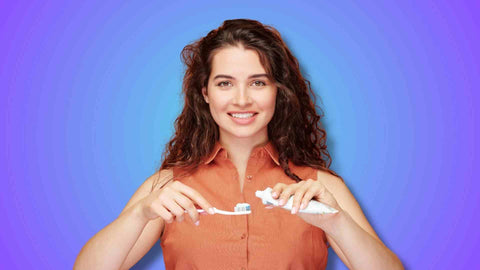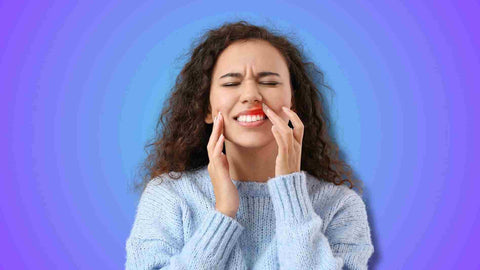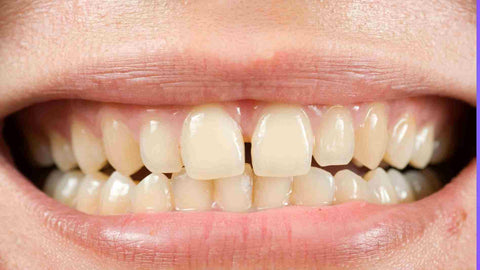Can You Use Whitening Toothpaste While Pregnant?
No, you should not use whitening toothpaste while pregnant. While there is no clear evidence that tooth whitening is harmful during pregnancy, dentists generally recommended that pregnant women avoid elective dental procedures, including teeth whitening procedures or using a teeth whitening kit, until after delivery.
This is because the safety of teeth whitening during pregnancy has not been extensively studied, and there is a lack of conclusive evidence regarding its safety. Additionally, the American Pregnancy Association (APA) advises that pregnant women should avoid elective dental procedures as this is a critical period of fetal development.
Dealing with stained or discolored teeth is certainly no fun. That said, if you are considering tooth whitening treatments during pregnancy, it is important to discuss the potential risks and benefits with your dentist or healthcare provider.
They can provide you with personalized advice based on your individual situation and help you make an informed decision. Ultimately, the health and safety of you and your baby should always be the top priority.
In this article, I'll explain everything you need to know about using whitening toothpaste during pregnancy.
Why should women avoid whitening teeth during pregnancy?

Teeth whitening is a cosmetic dental procedure that involves the use of chemicals like carbamide peroxide to remove stains and discolorations from our teeth. While whitening toothpastes are not bad per se, there are some potential risks and considerations to keep in mind, particularly if you are pregnant.
One of the main concerns with teeth whitening during pregnancy is the potential exposure to chemicals used in the whitening agents. While there is limited research on the effects of teeth whitening during pregnancy, it's important to consider the potential risks and side effects before making a decision.
Further, teeth whitening can cause gum sensitivity and irritation, particularly if you have pre-existing gum disease or other dental problems. Pregnant women may be more susceptible to gum sensitivity due to hormonal changes that can cause inflammation and swelling in the gums.

Finally, another potential risk of teeth whitening is dental erosion, which can occur when the enamel on our teeth is weakened or damaged by the chemicals used in the whitening process. Dental erosion can make our teeth more sensitive and increase the risk of tooth decay and other dental problems.
To minimize the risk of dental erosion, it's important to follow your dentist's instructions carefully and avoid overusing teeth whitening products. It's also important to maintain good oral hygiene habits, such as brushing and flossing regularly, to help protect your teeth and gums.
What happens to your teeth during pregnancy?
During pregnancy, hormonal changes can affect oral health. For example, increased levels of progesterone and estrogen can lead to an exaggerated response to plaque, potentially causing gingivitis, characterized by swollen, tender gums that may bleed during brushing or flossing. Let's walk through some of the key changes to your teeth during pregnancy.
Pregnancy Gingivitis
The American Dental Association reports, as referenced above, pregnancy gingivitis is a common condition that occurs during pregnancy due to hormonal changes, particularly increased levels of progesterone and estrogen. These hormones can exaggerate your body's response to plaque, leading to inflammation of the gums.
Symptoms of pregnancy gingivitis may include swollen, tender gums that bleed easily, especially when you brush your teeth or floss. It typically occurs between the second and eighth months of pregnancy and is more likely to affect pregnant mothers who already have gingivitis or poor oral hygiene habits.
Pregnancy Tumors

During pregnancy, you may experience a condition known as pregnancy tumors, which are non-cancerous growths that can develop on your gums. These small, red or purplish lumps may appear during the second trimester and are often related to hormonal changes, particularly increased estrogen levels.
While pregnancy tumors are typically harmless and tend to go away after childbirth, they can sometimes cause discomfort or bleeding. If you notice any unusual growths or changes in your gums during pregnancy, it's essential to consult with your dentist for proper evaluation and guidance.
Loosened Teeth

According to Orlando Health Women's Institute, the ligaments and bones in your mouth can loosen during pregnancy. Thankfully, this doesn't increase your change of loosing teeth, but it can certainly be disconcerting!
Does tooth whitening cause miscarriage?
No, there is no evidence that tooth whitening causes miscarriage. That said, dentists generally recommended that pregnant women avoid elective dental procedures involving tooth whitening until after delivery.
Is hydrogen peroxide safe for pregnant women?
While hydrogen peroxide is generally considered safe for pregnant women when used in small amounts for oral care, such as in toothpaste or mouthwash, high concentrations or excessive use can potentially lead to irritation or discomfort.
Therefore, dentists generally recommended that pregnant women avoid elective dental procedures, including using hydrogen peroxide in teeth whitening products, until after delivery.
Is it safe for pregnant women to use teeth whitening strips?

While the safety of using teeth whitening strips during pregnancy has not been extensively studied, dentists generally recommended avoiding elective dental procedures, including teeth whitening, during pregnancy as a precautionary measure.
Coconut whitening strips typically contain hydrogen peroxide or carbamide peroxide, which are the active ingredients responsible for whitening the teeth. The concern arises from the potential risk of exposing the developing fetus to unnecessary chemicals or procedures, even though the amount of peroxide in whitening strips is relatively low and typically not absorbed systemically. But you should keep in mind that whitening strips are not effective on dental crowns.
However, due to the lack of comprehensive research on this specific topic, it's best to err on the side of caution and postpone any teeth whitening until after delivery.
No, pregnant women should not use UV teeth whitening methods. UV teeth whitening methods typically involve the use of a special light or laser in combination with a whitening gel containing hydrogen peroxide or carbamide peroxide.
While there is limited research specifically addressing the safety of UV teeth whitening during pregnancy, dentists generally recommend pregnant women avoid elective dental procedures, including UV teeth whitening, unless absolutely necessary.
What kind of toothpaste is safe during pregnancy?
During pregnancy, it’s best to use a toothpaste that is free from harsh chemicals like fluoride, SLS, and artificial additives.
Research indicates that high fluoride intake may not be ideal for pregnant women, leading many to choose fluoride-free options.
A great alternative is nano-hydroxyapatite toothpaste, which helps strengthen enamel and prevent cavities without harmful ingredients. This ingredient is biocompatible, meaning it’s safe for both mom and baby.
Additionally, toothpaste without SLS can reduce the risk of mouth irritation and sensitivity, which some pregnant women experience.
Studies suggest that using gentle, non-toxic ingredients can support oral health without unnecessary risks. Choosing a natural toothpaste with nano-hydroxyapatite is a smart and safe option for expecting mothers.
5 Safe Tips for Whitening Teeth for Pregnant Women

Here are five safe tips for whitening teeth for pregnant women:
Use Hydroxyapatite Toothpaste
Opt for toothpaste containing nano hydroxyapatite, a safe alternative to teeth whitening toothpaste. While whitening toothpaste isn't bad, it can be too abrasive and cause damage to our enamel. Nano hydroxyapatite can effectively remineralize enamel and gently whiten teeth without posing any risks for pregnant women.
Choose Toothpaste with Baking Soda
Baking soda toothpaste is mildly abrasive and can help remove surface stains and whiten teeth without wearing away your enamel. It's a safe and natural option for whitening teeth during pregnancy.
Prevent Tooth Staining
Avoid foods and beverages known to stain teeth, such as coffee, tea, red wine, and dark-colored sodas to prevent teeth staining in the first place. Instead, try opting for lighter-colored beverages and rinse your mouth with water after consuming staining substances to minimize their effects on tooth color.
Drink Through a Straw
When consuming beverages that may stain teeth, make sure to use a straw to minimize direct contact between the liquid and your teeth. This can help reduce the likelihood of staining.
Maintain Good Oral Hygiene
Of course, you should brush and floss regularly to remove plaque and food particles that can contribute to tooth discoloration. Avoid activated charcoal teeth whitening, and instead opt for gentle toothpaste tablets instead.
By following these safe and practical tips, you can maintain a bright and healthy smile during pregnancy without compromising the well-being of yourself or your baby.
Frequently Asked Questions
What can I use to whiten my teeth while pregnant?
You can use nano hydroxyapatite toothpaste as it is a safe alternative to traditional teeth whitening products. Nano hydroxyapatite effectively remineralizes enamel and gently whitens teeth without any risks for pregnant women. Another option is toothpaste containing baking soda. It's mildly abrasive, helping to remove surface stains and whiten teeth without damaging enamel. This natural option is also safe for whitening teeth during pregnancy.
What to avoid in toothpaste when pregnant?
We recommend avoiding toothpaste containing fluoride, SLS (sodium lauryl sulfate), hydrogen peroxide, and other abrasive and whitening agents during pregnancy. While fluoride is generally safe in small amounts, excessive intake may pose several potential risks for pregnant women and developing babies. Instead, opt for toothpaste that contains nano hydroxyapatite, as it has not reported any potential risks while being effective and safe for your overall oral health.
Is hydrogen peroxide in toothpaste safe during pregnancy?
No, hydrogen peroxide in toothpaste is not considered safe during pregnancy. Pregnant women should avoid toothpaste containing hydrogen peroxide due to potential risks to maternal and fetal health. Hydrogen peroxide is a bleaching agent that may be too harsh for use during pregnancy, potentially causing irritation or harm. It's best to opt for toothpaste formulations without hydrogen peroxide like NOBS Toothpaste Tablets, focusing on safer alternatives for oral care during pregnancy. Always consult with a healthcare provider for personalized advice on dental care during pregnancy.
Why are my teeth turning yellow while pregnant?
During pregnancy, hormonal shifts and increased acidity in the mouth can cause teeth to turn yellow. Increased levels of hormones like estrogen and progesterone can make the gums more sensitive to plaque, which may result in inflammation and bleeding. Additionally, pregnant individuals may experience morning sickness and increased acidity in the mouth, which can erode enamel and expose the yellow dentin underneath. To prevent this discoloration, we recommend using nano hydroxyapatite toothpaste, which is safe for both pregnant women and children. This type of toothpaste not only helps whiten teeth but also strengthens enamel, promoting overall dental health.
What kind of toothpaste can I use while pregnant?
During pregnancy, it's important to choose toothpaste carefully. NOBS Toothpaste Tablets are a suitable option, as they are fluoride-free and contain nano hydroxyapatite. This formulation helps maintain oral health without exposing you or your baby to unnecessary risks. Additionally, the tablet form is convenient and easy to use, making it a practical choice for busy expectant mothers. Consulting with your dentist or healthcare provider for personalized recommendations is always recommended during pregnancy.
Is it safe to use whitening toothpaste everyday?
No, it's not safe to use whitening toothpaste every day, especially those with abrasive ingredients. Over time, they can wear down enamel and increase tooth sensitivity. It's better to use nano-hydroxyapatite toothpaste as it helps remineralize and strengthen enamel while providing a gentler whitening effect. Always consult your dentist for the best option based on your dental needs.






















